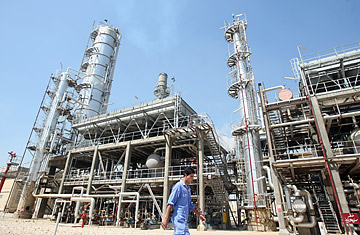
An Iraqi worker at the Dora oil refinery on the outskirts of Baghdad, March 27, 2011
Iran may have had a political boost from the Arab Spring in North Africa and the Middle East — with some new regimes apparently more sympathetic toward Tehran while others brace themselves against the Iranian regime's influence among opposition movements in the region. But there is no attendant economic windfall to all the change. Indeed, the Islamic Republic, the second largest oil producer in OPEC, has come to be very concerned about petroleum.
Iranian oil-ministry officials are worried that Tehran's clout will actually weaken in OPEC, which as a group decides on each member's maximum amount of oil output. Current Gulf rival Saudi Arabia is the heaviest hitter in the cartel; meanwhile, old rival Iraq has started to ramp up oil production. "When you talk to people internally, there is fear," says a veteran Tehran-based analyst who advises the government. "Now that Iraq has announced its expanded reserves, there is serious concern that our standing in OPEC has been damaged." That comes on the heels of news that Iran last year either lost or suffered reductions in contracts with many longtime business partners and traditional purchasers of its oil.
Iran has counted on the shortage of Iraqi oil production as a buffer against potential sanctions on purchases of Iranian crude, says the Tehran-based analyst. Although Iraq is currently excluded from OPEC's quota system, Iranian oil officials admit they are worried that the resurgence of its historical rival will affect Tehran's standing within the organization. (Baghdad and Tehran clashed over OPEC production targets before Iran's 1979 revolution and during the 1980s, when the two countries were engaged in an eight-year war.) While Iran has increased influence in Baghdad nowadays because of the country's Shi'ite-dominated government, that is not likely to diminish Iraq's determination to rehabilitate its war-hobbled petroleum industry.
The continued rise of Iraq's production capacity could, in the wake of an oil glut and international economic sanctions against the Islamic Republic, endanger Iran's standing as OPEC's second largest oil exporter. Already Iran has lost some of its market share to Iraq, which has better technology and can offer lower prices for similar grades of crude. "Some of Iraq's customers came to us after it occupied Kuwait and again in 2003 after Saddam Hussein fell with the U.S. invasion," says an official from Iran's national oil company, speaking from Tehran on condition of anonymity. "Now, because of Iran's political situation and difficulties with sanctions, those customers are going back to Iraq."
Iran, currently the organization's second largest exporter after Saudi Arabia, says it harbors more than 150 billion barrels in proven oil reserves and can pump up to 4.3 million barrels a day. Production during the past six months has been upwards of 3.6 million barrels a day, keeping the Islamic Republic positioned above Iraq with its roughly 143 billion barrels in proven reserves and most recent daily production capacity of 2.7 million barrels, according to leading energy-research firm Platts.
The oil-price surge of the past few weeks to over $100 a barrel should, in theory, have benefited Tehran, which needs crude export prices around $90 a barrel to avoid running a budgetary deficit, according to government figures. However, unlike most of its counterparts in OPEC, which have raised production to take advantage of rising oil prices, Iran has been reducing production because of a decline in export sales, according to Iranian oil officials. "We've had trouble selling and reduced output to minimize the level of crude going into storage," the Iranian government official says.
Storing large quantities of oil in offshore facilities is not abnormal for Iran, whose ailing refineries can't process the highly sulfuric and heavier grades of oil that make up most of the country's exports. Storage levels usually rise in December, when foreign firms sometimes delay lifting their crude in order to avoid paying higher taxes, and between the months of May and August, when Iran typically conducts annual second-quarter refinery maintenance and witnesses a decline in sales of its heavier grades of crude oil.
But for more than a year, Iran has been storing a consistent level of crude oil offshore and is currently harboring at least 20 million barrels of oil in tankers in the Persian Gulf, with additional crude stock on carriers in transit toward Egypt's Mediterranean coast, according to the senior oil official. U.N. sanctions imposed against the Islamic Republic last summer raised costs and lengthened the bureaucratic process behind purchasing Iranian oil, says the official. With OPEC supply at its highest level in two years, a number of Iran's longtime oil customers, including traditionally smaller purchasers like companies from Pakistan, have reduced or terminated their contracts. "With all the hassle, it's not worth a customer's time to buy from us if they can get it somewhere else," the Iranian official says. "If sanctions continue, this level of oil storage will, at a minimum, continue."
All that unsold oil comes at a bad time. In the wake of sanctions and dwindling foreign investment, the Islamic Republic has had to reinvest much of its oil revenue in the energy sector as it struggles to build new refineries and expand oil-production capacity. That provides the government with even less to spend on social programs as it tries to wean the Iranian populace off decades of expensive subsidies. All the new overseas political prestige may not help where it counts most — at home.
